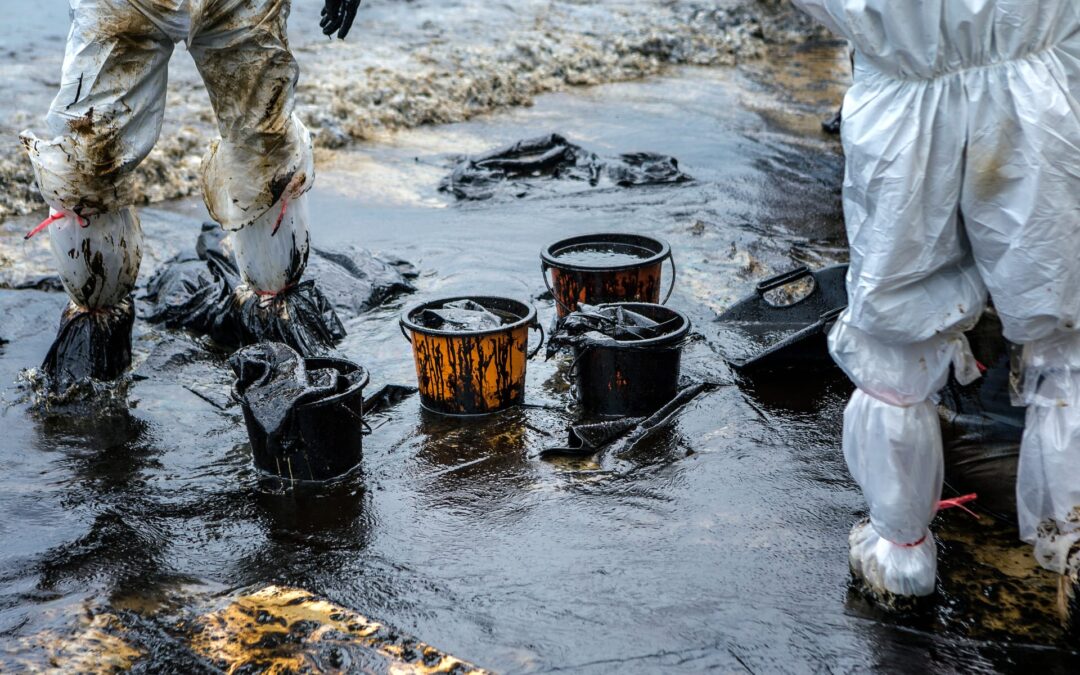Oil spills are catastrophic events that can have long-lasting and far-reaching impacts on the environment and economies of affected regions. These devastating incidents occur when oil is accidentally or intentionally released into marine or terrestrial ecosystems, causing severe damage to ecosystems, wildlife, and local communities. In this article, we will delve into the environmental and economic consequences of oil spills, exploring the detrimental effects they have on ecosystems, the challenges of cleanup and restoration efforts, and the lasting economic ramifications that communities face in the aftermath.
Environmental Consequences of Oil Spills
Destruction of Ecosystems
Marine Ecosystems: Oil spills have catastrophic effects on marine ecosystems, disrupting the delicate balance of marine life. Oil coats the surfaces of water bodies, suffocating and poisoning marine organisms such as fish, birds, mammals, and corals.
Terrestrial Ecosystems: When oil spills occur on land, they infiltrate soil and vegetation, contaminating habitats, and endangering plants, animals, and microorganisms. The toxicity of oil can persist for years, impeding the recovery of affected ecosystems.
Contamination of Water Resources
Drinking Water: Oil spills can contaminate freshwater sources, jeopardizing the availability of clean drinking water for both humans and wildlife. The toxins in oil pose significant health risks and can lead to long-term contamination of water supplies.
Coastal and Estuarine Areas: Oil spills in coastal and estuarine areas have dire consequences for delicate ecosystems. These regions serve as nurseries for numerous species and support critical food chains, making them particularly vulnerable to oil pollution.
Impacts on Wildlife
Marine Life: Oil spills result in the immediate death of marine organisms due to direct exposure to oil and its toxic components. Additionally, long-term effects include reduced reproductive success, developmental abnormalities, and compromised immune systems in surviving populations.
Birds and Mammals: Seabirds, dolphins, whales, and other marine mammals are severely impacted by oil spills. These animals often become coated in oil, leading to hypothermia, respiratory problems, ingestion of toxic substances, and disrupted migration patterns.
Challenges of Cleanup and Restoration Efforts
Technical and Logistical Challenges
Containment and Recovery: The containment and recovery of spilled oil are complex tasks, especially in harsh weather conditions or remote locations. The sheer volume of oil and its ability to spread rapidly makes it difficult to effectively remove from the environment.
Oil Sinking and Subsurface Contamination: Some types of oil sink or remain suspended in water, making cleanup efforts more challenging. Subsurface contamination poses long-term risks to marine life and can persist for years after an oil spill.
Ecological Damage and Recovery
Natural Recovery Processes: Ecosystems have some ability to recover naturally from oil spills, but the process can take years or even decades. Factors such as temperature, currents, and the type of oil spilled influence the speed and extent of recovery.
Ecosystem Management and Restoration: Human intervention is often required to accelerate the recovery of ecosystems affected by oil spills. Restoration efforts involve strategies like habitat protection, wildlife rehabilitation, and reintroduction programs to restore biodiversity and ecological balance.
Lasting Economic Ramifications of Oil Spills
Fisheries and Aquaculture
Loss of Productivity: Oil spills severely impact fishing grounds, leading to reduced fish populations, contaminated seafood, and diminished catch quotas. The economic losses for fishermen, seafood industries, and coastal communities can be devastating, often lasting for years.
Economic Ripples: The economic consequences of oil spills extend beyond the immediate impact on fishing. The decline in seafood availability and quality can lead to higher prices for consumers, reduced exports, and job losses throughout the seafood supply chain, including processing, transportation, and marketing.
Tourism and Recreation
Damage to Coastal Tourism: Many coastal regions rely on tourism as a major source of revenue. Oil spills tarnish the natural beauty of beaches and marine environments, deterring tourists and affecting businesses such as hotels, restaurants, and recreational activities.
Long-Term Reputation Damage: The negative publicity surrounding oil spills can create a long-lasting perception of environmental degradation, making it challenging for affected regions to recover their reputation and attract tourists even after the physical damages have been addressed.
Property Values and Real Estate
Decline in Property Values: Areas directly impacted by oil spills often experience a decrease in property values. Potential buyers and investors may be deterred by concerns over environmental contamination and the long-term impacts on the desirability and livability of affected areas.
Insurance and Financial Burdens: Property owners may face challenges in obtaining insurance coverage or experience increased premiums due to the perceived higher risk of future spills. Financial institutions may also be hesitant to provide mortgages or loans for properties in affected regions.
Government Expenditure and Legal Battles
Emergency Response Costs: Governments bear substantial financial burdens related to emergency response efforts, including containment, cleanup, and monitoring of oil spill sites. These costs can strain local and national budgets, diverting resources from other important public services.
Legal Consequences: Oil spills often lead to lengthy legal battles between affected parties, including government entities, affected communities, and the responsible parties or oil companies. Lawsuits and settlements can result in significant financial liabilities, further impacting the economy.
The environmental and economic consequences of oil spills are severe and long-lasting. These devastating incidents not only harm ecosystems and wildlife but also disrupt local economies, leading to job losses, declining property values, and economic hardship for communities that rely on industries such as fishing and tourism. The challenges of cleaning up and restoring affected areas are immense, requiring significant resources, expertise, and time. Prevention and preparedness, including stringent regulations, improved safety measures, and effective spill response plans, are crucial to minimize the occurrence and mitigate the impact of oil spills. Additionally, holding responsible parties accountable and ensuring fair compensation for affected communities can help alleviate some of the economic burdens. Ultimately, a collective effort is needed to protect our environment and economy from the long-lasting effects of oil spills.
Titan Source 1 is a leading environmental consulting company specializing in innovative solutions for environmental waste cleanup. Our cutting-edge products and expert services are designed to protect and restore natural ecosystems. With a commitment to sustainability and excellence, Titan Source 1 provides tailored strategies to address diverse environmental challenges. Partner with us to achieve a cleaner, safer, and healthier planet for future generations.


